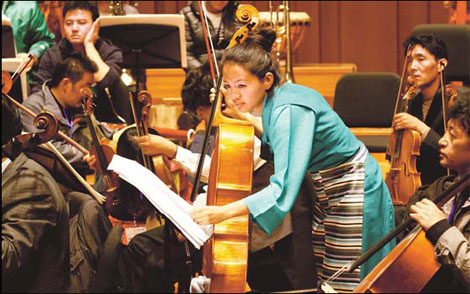Tibetan music on track
 |
|
A cellist at the Tibet Philharmonic Orchestra rehearsals. [Jiang Dong/China Daily] |
After graduating he returned to Lhasa to play erhu with a song and dance company. In 1985, conductor Zhang Guoyong, a professor at the Shanghai Conservatory of Music, went to Lhasa to recruit students. Penpa was selected again. Thus he returned to Shanghai for a four-year program on conducting.
Before TPO was founded in 2002, Penpa spent much of his time conducting the Song and Dance Company of Tibet autonomous region for folk song and dance shows.
"It was a hard time. Most of what I learned in the conservatory - Western classical music - was useless," Penpa says. "It was the love for music that encouraged me to hold on."
Penpa is not the only one to have received musical training outside Tibet. Lhapa Drolma, 38, plays biwan. She learned the erhu at the Art School of Central University for Nationalities some 20 years ago. Champa Tashi, and the principal cellist Mama Yiba, 59, were both recruited by the Art School of Central University for Nationalities in 1963. After seven years of training, Mama Yiba returned to join the Song and Dance Company of Tibet autonomous region in 1970; while Champa Tashi pursued further studies at Shanghai Conservatory of Music in the early 1980s.
"I was a primary school student. I remember one day, some teachers from a Beijing music school visited the class. It could not be called an audition. Obviously few of us had learned music. They just asked us to clap to certain rhythms and do other very simple tests," Mama Yiba says.
Many Tibetan artists were recruited by arts schools in Beijing, Shanghai and other major cities, after 1959, and most of the TPO's members are the fruits of this outreach program.
The TPO was formed in 2002 from artists gathered from the Song and Dance Company of Tibet autonomous region, Shannan Prefecture Arts Ensemble, Lhasa Song and Dance Company and the Tibet Art College. Penpa, the only conductor in Tibet, was appointed principal conductor. Only one of its 65 members is not Tibetan, a Han Chinese in Tibet.
They perform in Lhasa's theaters, campuses and big communities. Every New Year's eve, they perform a New Year Concert broadcast by Tibet TV. The repertoire is a mixture of popular Western classical pieces and Tibetan music. Many are works created by Tibetan musicians who write scores in Western form, but adopt Tibetan instruments and tunes.
"To some degree the financial condition is quite good. The government funds every concert. Honestly speaking, so far, there is no market demand for Western classical music in Tibet. We seldom give commercial performances. Most concerts are just to promote classical music or introduce Tibetan music to the youth," Penpa says.
Since the government only pays per concert, it means the TPO is short of funds to buy new instruments or recruit new members.
According to Mama Yiba, many of the orchestra's instruments were bought in the 1970s and 1980s. Some were gifted by the National Symphony Orchestra in the 1960s. For the concert in Beijing, they rented a harp to play From the New World, as the one they bought in 1976 was inadequate.
Penpa says another frustration is that instrumentalists come from several ensembles in different areas and only gather when there is a concert, so it's difficult to rehearse, let alone develop a rich repertoire. Friday's concert was the first time they had played the entire From the New World.
"Even so, I am satisfied with my job. Compared to 30, 20 or just 10 years ago, conditions have greatly improved. More and more Tibetans appreciate our music," Penpa says.
"I was once proud of being the only Tibetan conductor, but now I hope the young generation will mature soon. Music needs new blood."
 0
0 







Go to Forum >>0 Comments